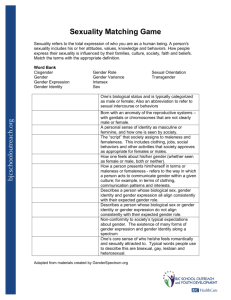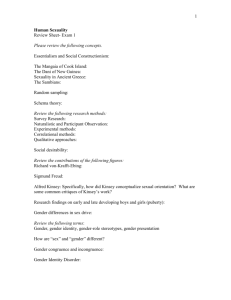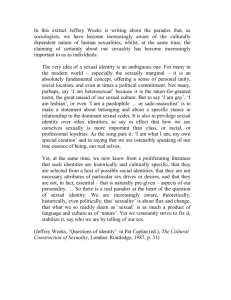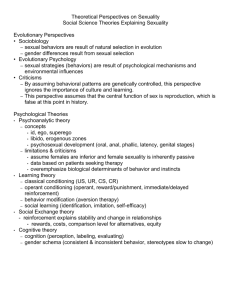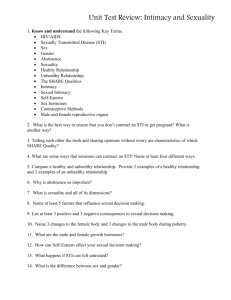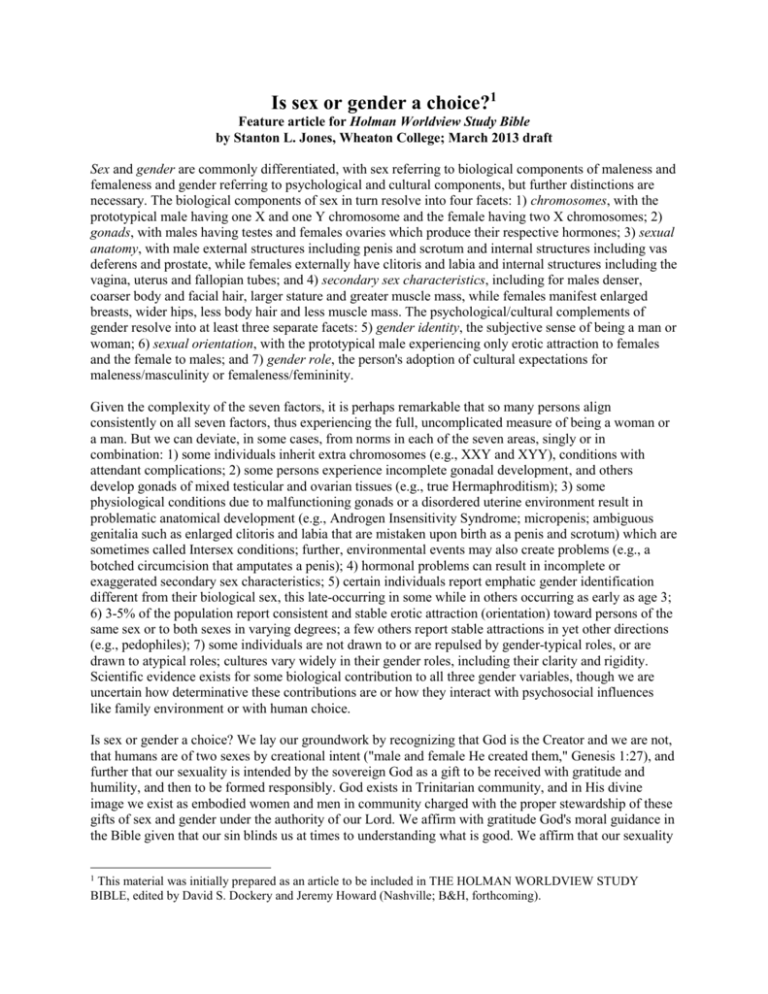
Is sex or gender a choice?1
Feature article for Holman Worldview Study Bible
by Stanton L. Jones, Wheaton College; March 2013 draft
Sex and gender are commonly differentiated, with sex referring to biological components of maleness and
femaleness and gender referring to psychological and cultural components, but further distinctions are
necessary. The biological components of sex in turn resolve into four facets: 1) chromosomes, with the
prototypical male having one X and one Y chromosome and the female having two X chromosomes; 2)
gonads, with males having testes and females ovaries which produce their respective hormones; 3) sexual
anatomy, with male external structures including penis and scrotum and internal structures including vas
deferens and prostate, while females externally have clitoris and labia and internal structures including the
vagina, uterus and fallopian tubes; and 4) secondary sex characteristics, including for males denser,
coarser body and facial hair, larger stature and greater muscle mass, while females manifest enlarged
breasts, wider hips, less body hair and less muscle mass. The psychological/cultural complements of
gender resolve into at least three separate facets: 5) gender identity, the subjective sense of being a man or
woman; 6) sexual orientation, with the prototypical male experiencing only erotic attraction to females
and the female to males; and 7) gender role, the person's adoption of cultural expectations for
maleness/masculinity or femaleness/femininity.
Given the complexity of the seven factors, it is perhaps remarkable that so many persons align
consistently on all seven factors, thus experiencing the full, uncomplicated measure of being a woman or
a man. But we can deviate, in some cases, from norms in each of the seven areas, singly or in
combination: 1) some individuals inherit extra chromosomes (e.g., XXY and XYY), conditions with
attendant complications; 2) some persons experience incomplete gonadal development, and others
develop gonads of mixed testicular and ovarian tissues (e.g., true Hermaphroditism); 3) some
physiological conditions due to malfunctioning gonads or a disordered uterine environment result in
problematic anatomical development (e.g., Androgen Insensitivity Syndrome; micropenis; ambiguous
genitalia such as enlarged clitoris and labia that are mistaken upon birth as a penis and scrotum) which are
sometimes called Intersex conditions; further, environmental events may also create problems (e.g., a
botched circumcision that amputates a penis); 4) hormonal problems can result in incomplete or
exaggerated secondary sex characteristics; 5) certain individuals report emphatic gender identification
different from their biological sex, this late-occurring in some while in others occurring as early as age 3;
6) 3-5% of the population report consistent and stable erotic attraction (orientation) toward persons of the
same sex or to both sexes in varying degrees; a few others report stable attractions in yet other directions
(e.g., pedophiles); 7) some individuals are not drawn to or are repulsed by gender-typical roles, or are
drawn to atypical roles; cultures vary widely in their gender roles, including their clarity and rigidity.
Scientific evidence exists for some biological contribution to all three gender variables, though we are
uncertain how determinative these contributions are or how they interact with psychosocial influences
like family environment or with human choice.
Is sex or gender a choice? We lay our groundwork by recognizing that God is the Creator and we are not,
that humans are of two sexes by creational intent ("male and female He created them," Genesis 1:27), and
further that our sexuality is intended by the sovereign God as a gift to be received with gratitude and
humility, and then to be formed responsibly. God exists in Trinitarian community, and in His divine
image we exist as embodied women and men in community charged with the proper stewardship of these
gifts of sex and gender under the authority of our Lord. We affirm with gratitude God's moral guidance in
the Bible given that our sin blinds us at times to understanding what is good. We affirm that our sexuality
1
This material was initially prepared as an article to be included in THE HOLMAN WORLDVIEW STUDY
BIBLE, edited by David S. Dockery and Jeremy Howard (Nashville; B&H, forthcoming).
is a gift given for purposes beyond our individual existence; maleness and femaleness typically sets the
foundation for marriage, a covenantal union of one man and one woman including full sexual intimacy
that usually results in the procreation of children and the extension of multigenerational families.
Sexuality is a gift with relational and community entailments; we are gifts to the other.
Christians do not insist that every biological or psychological given is God's will. Because of sin, neither
we as individuals nor the world around us is as God intended; we experience disorder. For example, in
the realm of gender roles, reasonable Christians recognize that there is much room for responsible choice;
many would support the young woman who wants to study business leadership or science, or the young
father who chooses parenting and homemaking in support of his wife's career given her higher earning
power, and do so without denying unique callings of men and women. Where cruelty or immorality is a
cultural norm, we refuse to conform and seek to produce cultural change (e.g., the Hindu practice of
settee, the burning to death of a widow with the cremation of her husband's body, or the practice of
female genital mutilation in certain African and Islamic cultures).
There is legitimacy to seeking to correct disorders in the realm of physical sexual characteristics as well.
As we would support surgical correction of a child’s cleft palette, so we would support reattachment of a
severed penis, testosterone-enhancing treatments for a man whose low testosterone condition depletes
energy and sexual desire, or surgical breast reduction for a woman whose very large breasts contribute to
muscular and spinal pain.
But more radical options are now possible. The question of whether sex or gender is a choice is
complicated today by our technological prowess that allows us to intervene medically or psychologically
in ways once impossible. Such possibilities present us with a dilemma: While Christians mostly approve
of the repair of disorders, what of cases like the homosexual transsexual who, though born biologically
female, undergoes sexual reassignment surgery to remove her ovaries and construct an artificial penis,
takes testosterone and develops male secondary sex characteristics, reports psychological identification as
a man, adopts culturally masculine roles, and yet desires sex with other men? In this case, six of the seven
dimensions of sex/gender have been deviated from the presumptive norm with only the chromosomes
unchanged. What do we make of her/his argument that "gay male identity is congruent with how I have
always felt and how God has made me "?
These issues are clouded in a secular culture that rejects the Creator and His creational intent, and thereby
rejects that norms of any kind govern our behavior, and further, on this basis, rejects the idea that
departures from these norms constitute disorders in any objective sense. In the area of sexuality, we have
seen steady shifts in the official mental health diagnostic criteria of what constitute sexual disorders, with
many behavior or arousal patterns that were once regarded as "deviant" becoming normalized, including
non-heterosexual orientation and "fetishes." Biblical Christians in humble and full submission to Christ
will accept the gift of their sexuality along with biblical norms for expression of that sexuality.
Even more fundamentally, a materialistic worldview posits a cosmos in which chance alone determines
outcomes, robbing us of any deep sense of meaning or good. With only a vague aspiration of genetic
propagation and evolutionary progress as a guide, brute assertion of human will against cruel chance may
be all that is left, leading to something like the broad societal embrace of the original satanic temptation
placed before Adam and Eve at the time of the Fall, that through actively exercising their choice in
violation of the norm "you will be like God, knowing good and evil" apart from God (Genesis 3:5).
Are we living at a time when many fit the Apostle Paul’s harsh description in Romans 1 of persons who
"exchange the glory of the incorruptible God for an image in the form of corruptible man" (v. 23) with the
result that "they did not see fit to acknowledge God any longer" (v. 28)? As an example of such a
prioritization of human will, the American Psychological Association (www.apa.org), in its 2009 report
on Appropriate Therapeutic Response to Sexual Orientation contrasted Christian religious understandings
of personal identity grounded in external and transcendent norms against "gay affirming" psychological
approaches of “living with a sense of wholeness in one’s experiential self…. [a] perspective [that] gives
priority to the unfolding of developmental processes, including self-awareness and personal identity” (p.
26). The Christian stance of personal submission to God's will indeed contrast with an insistence that
personal identity is best established by achieving congruence first with one’s "one’s experiential self."
Wise Christians will recognize that as a result of our disorder and that of our world, we experience
discord – between physical sex and the sexual prototypes, between facets of our sex and gender, between
our personal inclinations and cultural standards, between biblical norms and our personal inclinations (or
cultural standards), and other instances of discord as well. Resolution of that discord may take many
forms, and require us as humble stewards to make complex choices. There are times to intervene
medically or psychologically to correct disorders, following Christ’s model as Healer. There are times
properly to violate prevailing gender roles at God's calling; we have positive precedents in biblical stories
of women who were prophetesses, judges, or who participated in acts of war.
More troubling are cases like transsexualism where one’s gender identity is discordant with the clear
testimony of biological sex. Many today reject pathologization of this condition and see it as part of
human diversity, but in Christian perspective incorporating God’s creational intent, such conditions must
be seen as disorders. In such instances, while our overarching call is to pursue conformity of our lives
(body and soul) to God's revealed will (1 Timothy 4:1-5) and to seek his sovereign healing in confidence
of our ultimate healing in eternity, it can be very difficult to discern the proper response. A simple tyranny
of the experiential self and a facile manipulation of biological sex must be rejected even as we seek how
to respond compassionately to persons suffering with an objective disorder.
We must resist the illusion that the ultimate determination of our sex and gender is ours to make
autonomously. There are indeed many choices to be made about how we live out our sexuality. But in the
deepest sense, our choices that shape sex and gender should reflect God’s choices for us.





